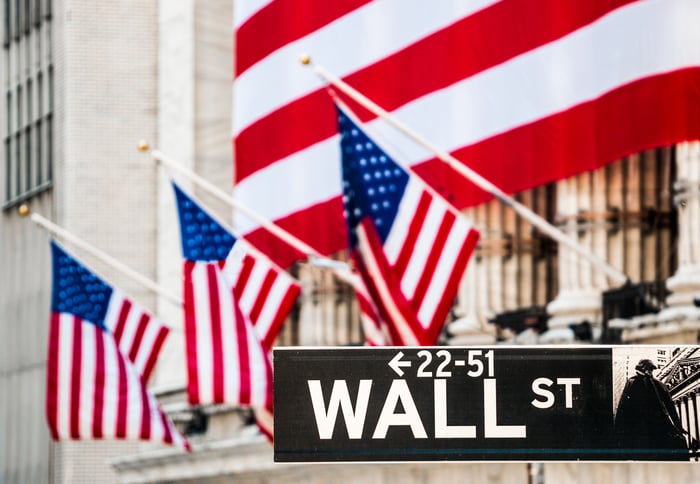Since May 1896, the iconic Dow Jones Industrial Average (^DJI 0.40%) has served as one of the most-watched barometers of Wall Street's health. What was once an index of 12 mostly industrial components has evolved into an index containing 30 relatively diverse, historically profitable, multinational businesses.
Unfortunately, diversification doesn't fix the Dow Jones Industrial Average's biggest flaw: its point-weighted structure. Whereas the benchmark S&P 500 is a market cap-weighted index -- i.e., larger companies (by market cap) exert greater influence -- the Dow Jones is a price-weighted index. In other words, share price, not market cap, is all that matters.
As of this past August, the Dow's divisor was 0.15172752595384. In simpler terms, every dollar in share price equates to about 6.59 Dow points. Thus, if a Dow component gains or loses $1 in share price, the Dow Jones Industrial Average rises or falls by 6.59 points.

Image source: Getty Images.
An example of this price-weighted inefficiency can be seen in tech stock Apple, which is currently the second-largest publicly traded company at a market cap of $2.9 trillion. However, it only has the 14th-highest share price among the Dow's 30 components. Thus, Apple has less influence in the Dow than aerospace and building technologies company Honeywell International, which has a market cap of "just" $127 billion, or around 4% that of Apple.
The five Dow components with the lowest share prices in the ageless index -- Walgreens Boots Alliance, Verizon Communications, Intel, Cisco Systems, and Dow Inc. -- collectively account for just 3.6% of its weighting.
By comparison, the following five stocks add up to almost 34% of its weighting (as of Feb. 2, 2024).
UnitedHealth Group: 8.70% weighting in the Dow
Sporting a share price north of $510 as of the closing bell on Feb. 2, health insurance and healthcare services company UnitedHealth Group (UNH 0.30%) accounted for almost 3,363 Dow points by itself. If you're wondering why UnitedHealth hasn't split its stock, giving up its importance within the Dow might be a key reason.
Most people are familiar with UnitedHealth Group because of its consumer-facing insurance operations. Although the Affordable Care Act has somewhat crimped the ability of health insurers to raise premiums, UnitedHealth is still generating plenty of profit from this segment.
The real bread-and-butter growth driver for UnitedHealth has been its Optum subsidiary. Optum is divided into three operating segments and is responsible for everything from pharmacy services and care management to the software used by hospitals and care centers. It's a considerably faster-growing division that's generating a consistently juicier operating margin than UnitedHealth's insurance operations.
Microsoft: 7.01% weighting
The largest publicly traded company by market cap, Microsoft (MSFT 1.82%), is the second-most-influential Dow component. A closing price above $411 per share as of Feb. 2 means it accounts for around 2,710 Dow points.
As I've pointed out in the past, Microsoft's undeniable success is a reflection of its blending of the old and the new. Today, the tech titan is being fueled by dominant cloud infrastructure service Azure, as well as its aggressive investments in OpenAI and seemingly all things artificial intelligence (AI). Enterprise spending on the cloud and AI is still in its relative infancy, which offers hope that Azure can sustain a double-digit growth rate for a long time to come.
At the same time, Microsoft's legacy segments remain important. For instance, even though Windows isn't the growth story it was 25 years ago, it's still the dominant operating system on desktops worldwide. The high-margin cash flow Microsoft generates from its legacy products is what fuels investments in fast-paced initiatives, as well as earnings-accretive acquisitions.

Image source: Getty Images.
Goldman Sachs: 6.61% weighting
Global investment banking giant Goldman Sachs (GS 1.79%) exerts the third-largest influence within the widely followed Dow Jones. A nearly $388 share price as of Feb. 2 means Goldman Sachs is singlehandedly responsible for 2,556 Dow points.
History is the big catalyst that's long worked in Goldman Sachs' favor. Even though recessions are an inevitable part of the U.S. and global economies, history shows that economic downturns don't last long. Only three of the 12 recessions that have taken place in the U.S. since the end of World War II reached 12 months in duration, with none surpassing 18 months. Meanwhile, periods of expansion usually last for years. These long-tailed expansions allow Goldman Sachs to take advantage of merger-and-acquisition activity and businesses' desire to borrow.
Goldman Sachs has also done a good job of reining in costs over the past year. It's aiming to reduce its annual operating expenses by $1 billion through combination of job cuts and a willingness to let go of business segments that aren't working out. This is why it sold buy now, pay later service GreenSky to a consortium of investors at Sixth Street in October.
Home Depot: 6.09% weighting
The Dow component with the fourth-highest weighting is none other than do-it-yourself home improvement chain Home Depot (HD 0.94%). Based on a closing share price of more than $357 on Feb. 2, Home Depot accounted for roughly 2,354 Dow points.
The beauty of Home Depot's operating model is that it tends to benefit no matter what's going on with the U.S. housing market. If the U.S. economy is booming and home prices are rising, it's liable to see healthy gains from contractors and its enterprise-facing segments. Meanwhile, if mortgage rates are increasing and/or there's uncertainty in the housing market, Home Depot benefits from homeowners upgrading or renovating their existing homes.
Furthermore, Home Depot's aggressive investments in digitization are paying off handsomely. The company's efforts to create a seamless omnichannel shopping experience have led more consumers to buy products online and book high-margin projects completed by professionals. It's also investing in AI and machine learning tools to improve inventory management and streamline the ordering process.
Amgen: 5.51% weighting
The stock with the fifth-highest weighting the Dow Jones Industrial Average is biotech company Amgen (AMGN 0.22%). Amgen's roughly $323 share price as of Feb. 2 equates to about 2,130 Dow points. Altogether, UnitedHealth Group, Microsoft, Goldman Sachs, Home Depot, and Amgen were responsible for 13,113 Dow points as of the end of last week.
A big reason for Amgen's long-term success is the simple fact that healthcare is a very defensive sector. Since we can't control when we become ill or what ailments we develop, demand for prescription drugs tends to be constant in any economic climate. This means relatively predictable cash flow and a transparent growth outlook for a drug developer with a broad portfolio of products.
Innovation is the other force behind Amgen's steady long-term climb. Even though it's no longer growing at the same rapid clip it was 15 years ago, it's still enjoying double-digit unit volume growth for its therapies. Examples include hyperlipidemia treatment Repatha, which saw worldwide sales and unit growth of 31% and 44%, respectively, in the quarter ending in September, as well as severe asthma treatment Tezspire, whose sales nearly tripled in Q3 from the prior-year period.





